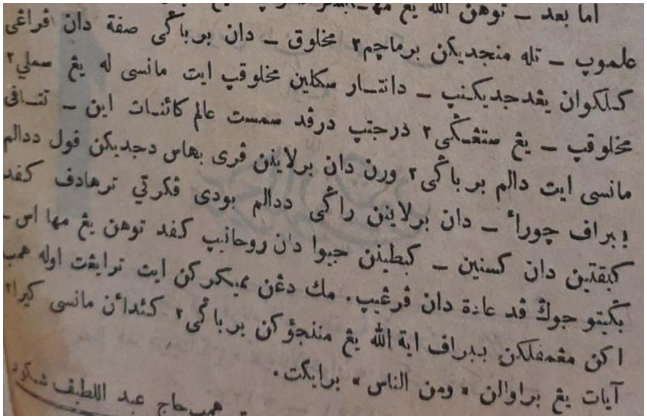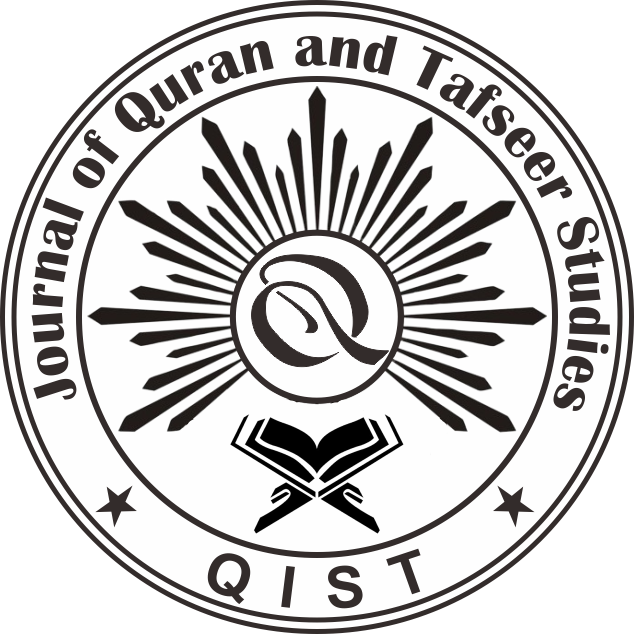EXPLORING THE DISTINCTIVE FEATURES OF INDONESIAN TAFSIR AL-QURAN: A STUDY OF SHEIKH ABDUL LATIF SYAKUR'S AD-DA'WAH WA AL-IRSYĀD ILĀ SABĪLI AR-RASYĀD
DOI:
https://doi.org/10.23917/qist.v3i1.2912Keywords:
Indonesian Interpretation, Traditions and Culture, Thematic Interpretation, Abdul Latif Syakur, Quranic ExegesisAbstract
Tafsir Al-Quran Indonesia has its own characteristics. The Koran interpretation struggles with the guide's traditions and culture. One of the exciting interpretations is ad-Da'wah wa al-Irsyād ilā Sabīli ar-Rasyād, written by Sheikh Abdul Latif Syakur. This paper attempts to explain the biography of Sheikh Abdul Latif Syakur, his methodology of interpretation, as well as the Indonesian side of his interpretation. This research is library research and is qualitative. The results showed that Sheikh Abdul Latif Syakur was a Minangkabau cleric who studied in Makkah from childhood to adulthood. This interpretation is a thematic interpretation of phrases that collect verses with the prefix wa min an-Nās, characterized by Ijtima'i adab. This interpretation also has an Indonesian side.
References
L. A. Mutalib, W. Ismail, and ..., "Scientific exegesis of al-quran and its relevance in dealing with contemporary issues: An appraisal on the book of 'al-jawahir fi tafsir al-quran al-karim," Int. J. ..., 2019, [Online]. Available: https://oarep.usim.edu.my/jspui/handle/123456789/1342.
M. I. Yüksek, "The basis of the distinction of meaning-interpretation in Tafsir methodology," Cumhur. Ilah. Derg., vol. 22, no. 1, pp. 113–139, 2018, doi: 10.18505/cuid.407201.
M. Z. Qadafy, "Qur'anic exegesis for commoners: A thematic sketch of non-academic tafsīr works in Indonesia," Stud. Islam., vol. 26, no. 2, pp. 247–276, 2019, doi: 10.15408/sdi.v26i2.8144.
S. Hidayat, "THE QORANIC VIEW OF THE WORLD'S RELIGIONS STUDY OF THE INDONESIA MINISTRY OF RELIGIOUS AFFAIRS' AL-QURAN DAN TAFSIRNYA AND M. QURAISH SHIHAB'S TAFSIR AL-MISHBÂH," Rev. Gest. Soc. e Ambient., vol. 17, no. 5, 2023, doi: 10.24857/rgsa.v17n5-010.
M. S. Apriantoro and R. D. P. Rosadi, "Political Interpretation of the Caliphate Verse in The Qur'an by Sunni and Shia," in International Conference on Islamic Studies (ICIS), 2021, pp. 1–12.
S. Suwinarno, "TAFSIR AYAT-AYAT KAUNIYAH DALAM BINGKAI EPISTEMOLOGI ISLAM," Suhuf, vol. 27, no. 1, pp. 117–120, 2015.
J. A. Rohmana, "Al-Qur'a¯n wa al-Isti'ma¯r: Radd al-Shaykh al-Ha¯jj Ahmad Sanusi (1888-1950) 'alá al-Isti'ma¯r min Khila¯l Tafsi¯r Mal'ja' al-Ta¯libi¯n," Stud. Islam., vol. 22, no. 2, pp. 297–332, 2015, doi: 10.15408/sdi.v22i2.1921.
A. L. Syakur, Tafsir ad-Da'wah wa al-Irsyād ilā Sabīli ar-Rasyād. Bukit Tinggi: Tamrah al-Ikhwan, 1951.
M. A. Hocini, M. Abdullah, and F. Bounama, "The qur'anic aspects of human development with special reference to the role of 'aqĪdah in tafsĪr al-zilĀl of sayyid quṬb: A thematic study," Afkar, vol. 22, no. 2, pp. 321–394, 2020, doi: 10.22452/afkar.vol22no2.10.
M. S. Apriantoro, "The Concept of Taqlid From The Mu'tazilah's Perspective in The Book of Raudhat an-Nadzir wa Junnat al-Manadzir," Islam. Rhetor. Balanc. Environ. Sustain. Dev. Prospect., p. 82, 2021.
M. S. Apriantoro, V. S. R. Makin, and M. N. Maarif, "Islamic law perspective on the bajo indigenous people's marriage tradition in Adonara village," YUDISIA J. Pemikir. Huk. dan Huk. Islam, vol. 14, no. 1, pp. 47–62, 2023.
M. S. Apriantoro, M. N. I. Alis, S. Septianozakia, and D. Setiana, "Comparing KHI and KHES in Marital Property Grant Disputes: An Analysis of Judges' Views," Al-Istinbath J. Huk. Islam, vol. 8, no. 1 May, pp. 37–52, 2023.
D. M. Diana and M. S. Apriantoro, "Islamic Perspectives on Installment-Based Online Trading of Gold: Ensuring Compliance with Value and Principles," ETHICA Int. J. Humanit. Soc. Sci. Stud., vol. 1, no. 1, pp. 11–19, 2023.
U. Fikriyati and A. Fawaid, "SAVING LIVES AND LIMITING THE MEANS AND METHODS OF WARFARE Five Indonesian Tafsīr Views," Al-Jami'ah, vol. 60, no. 1, pp. 167–198, 2022, doi: 10.14421/ajis.2022.601.167-198.
M. A. Setiawan and Y. Dahliana, "REGULATIONS FOR MOSQUE AND MUSHALA VOICES IN THE PERSPECTIVE OF THEMATIC INTERPRETATION ON VOICE RULE IN WORSHIP," QiST J. Quran Tafseer Stud., vol. 1, no. 2 SE-Articles, pp. 223–237, Aug. 2022, doi: 10.23917/qist.v1i2.1074.
Y. Baihaqi, A. Kasdi, U. Farida, and H. Maraliza, "The Marriage of Indigenous Peoples of Lampung Saibatin in the Perspective of Islamic Law and Tafsir of Gender Verses," Samarah, vol. 6, no. 1, pp. 311–330, 2022, doi: 10.22373/SJHK.V6I1.12493.
M. A. Al-Sobuni, "Safwah al-Tafasir," Safwah al-Tafasir, 2004.
M. Daneshgar, "An Old Malay Manuscript of Tafsīr and Tajwīd: Formative Islamic Sciences in Nusantara," in Texts and Studies on the Qur'an, vol. 20, Brill Academic Publishers, 2023, pp. 163–181.
K. Al-Kilani and A. Alzyout, "Connecting the Qur'anic verses with reality in Ibn Ashour's Tafsir the concept of the (sociality and economy as a model)," Dirasat Hum. Soc. Sci., vol. 48, no. 1, pp. 326–340, 2021, [Online]. Available: https://www.scopus.com/inward/record.uri?eid=2-s2.0-85104356971&partnerID=40&md5=2ba6285338615ea9adc908697b21ab45.
O. M. Abou-Bakr, "The Egalitarian Principle of 'Qist' as Lived Ethic: Towards a Liberational Tafsir," Religions, vol. 14, no. 9, 2023, doi: 10.3390/rel14091087.

Downloads
Submitted
Accepted
Published
How to Cite
Issue
Section
License
Copyright (c) 2023 Azizah Romadhona, Muhamad Subhi Apriantoro, Laila Muhammad Rasyid

This work is licensed under a Creative Commons Attribution 4.0 International License.

















